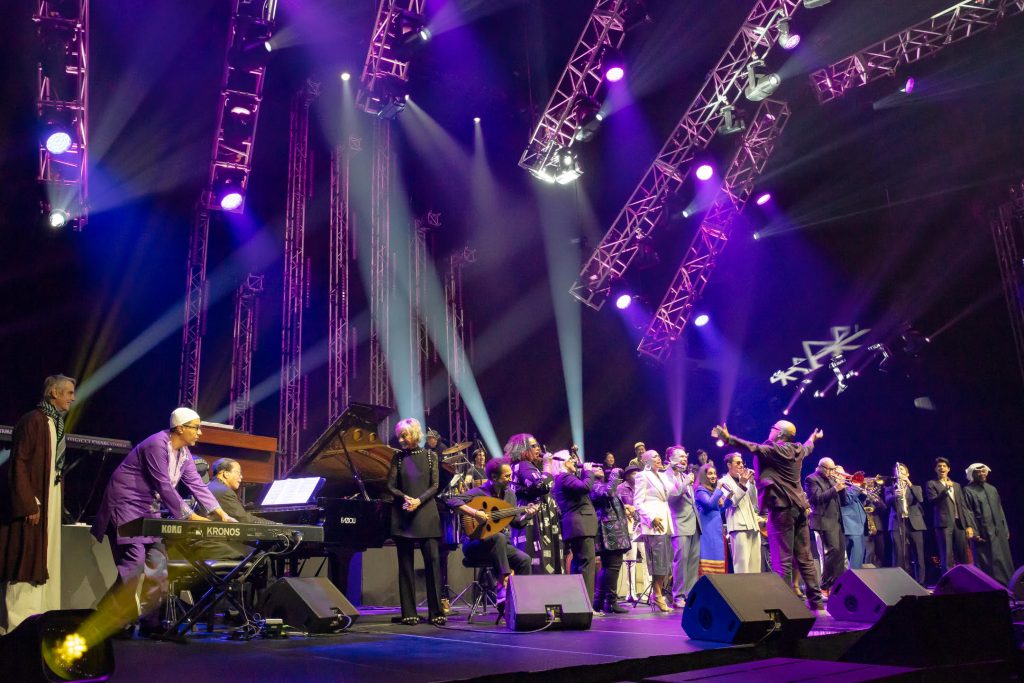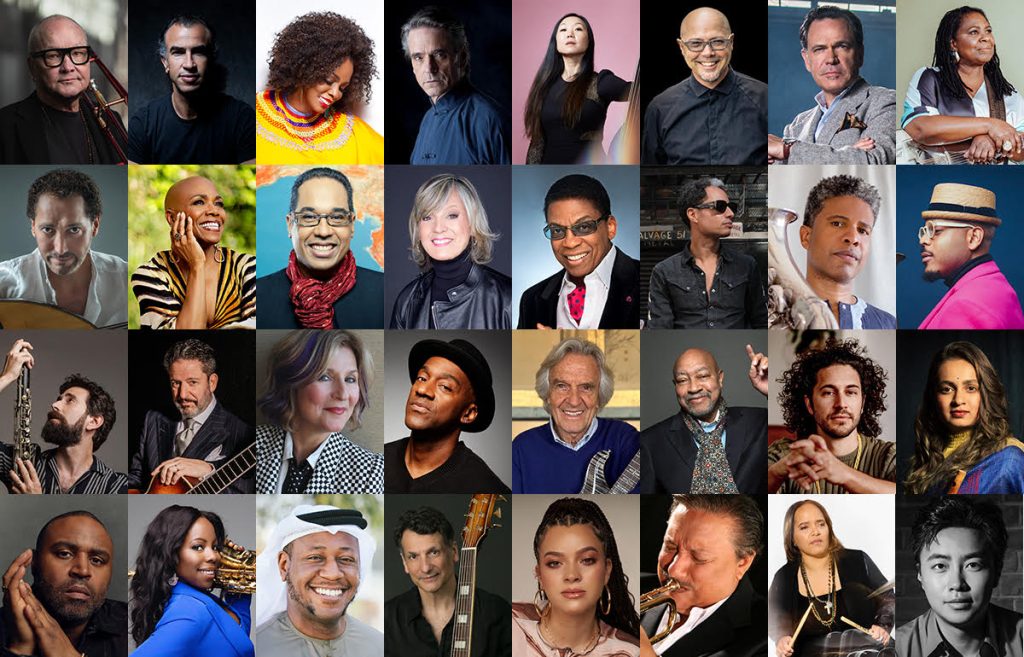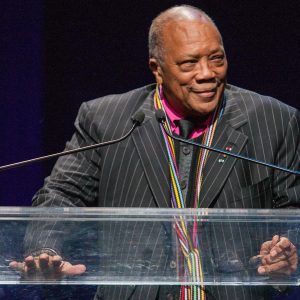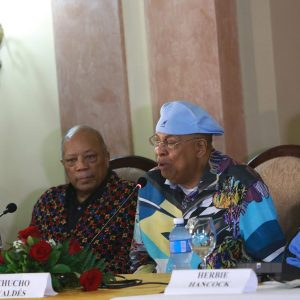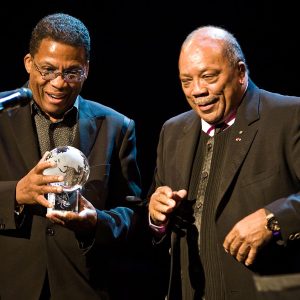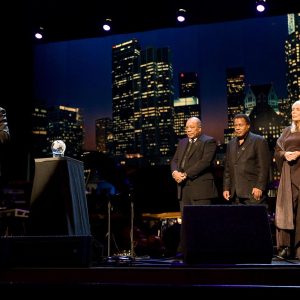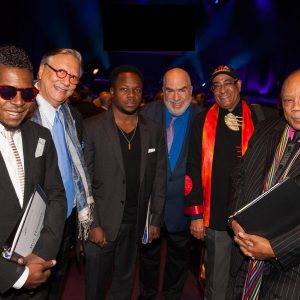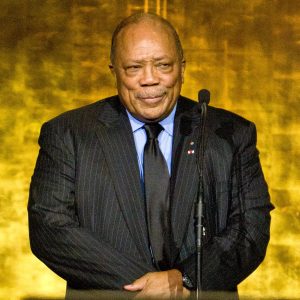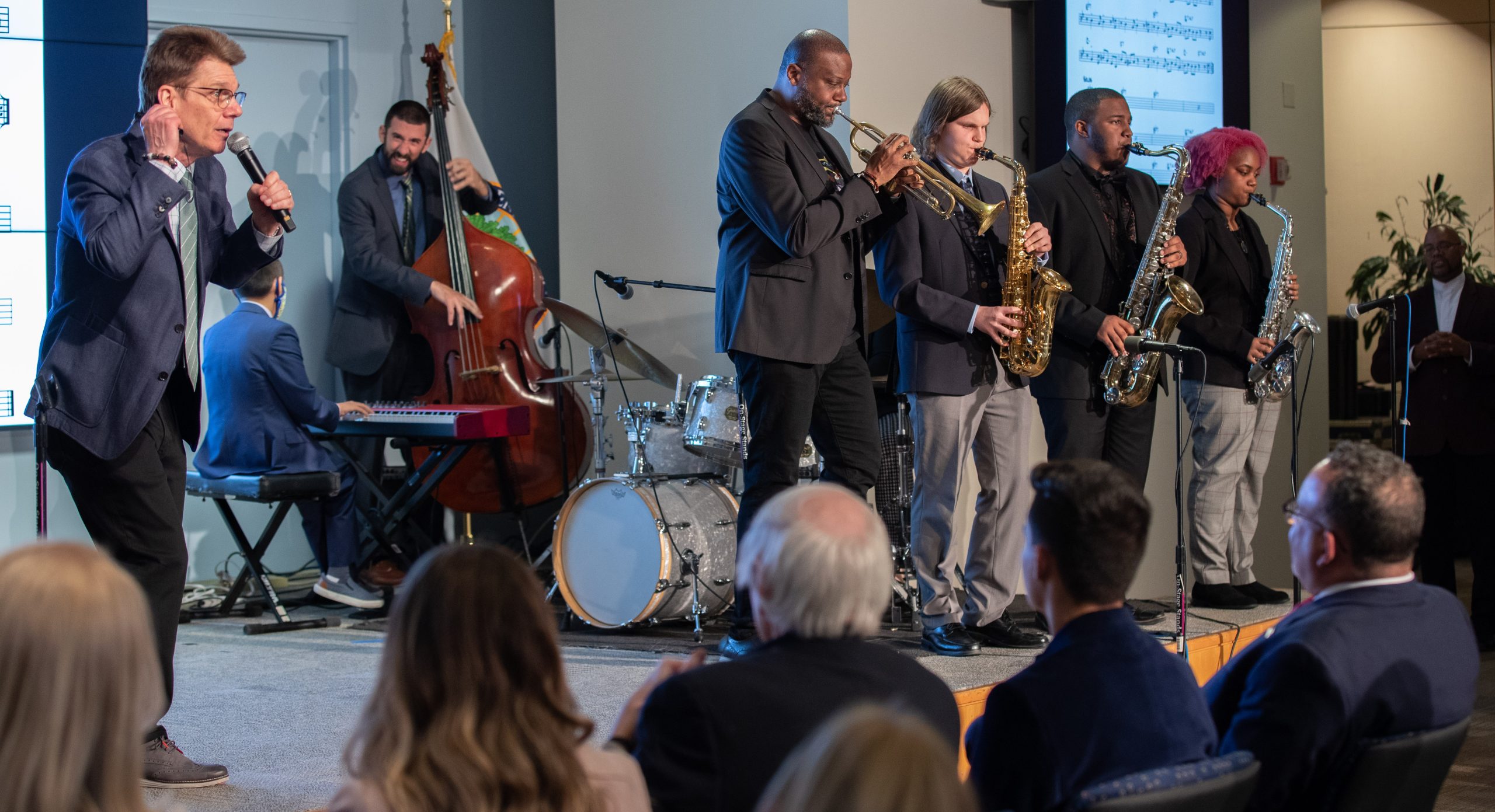Six extraordinary young jazz musicians from around the world were selected for the Herbie Hancock Institute of Jazz Performance at UCLA, Class of 2027. Each will begin the intensive, full-scholarship program in September 2025 and attain a Master of Music in Jazz Performance degree from The UCLA Herb Alpert School of Music – one of the nation’s top music schools – in spring 2027.
The Class of 2027 includes trumpeter Nicolaus Gelin of Miami, FL; trombonist Nathan Gilbreath of Seattle, WA; guitarist Mwanzi Harriott of Miami, FL; bassist Yerin Kim of Daejeon, Republic of Korea; pianist Elisee Ngbo of Beacon Falls, CT; and drummer Mailo Rakotonanahary of Paris, France. The musicians were selected through a rigorous application process culminating in an audition judged by legendary pianist Herbie Hancock; renowned musician, producer and philanthropist Herb Alpert; and Institute of Jazz Performance classmates and Institute of Jazz Performance Artistic Director Ambrose Akinmusire and Blue Note recording artist Walter Smith III.
Akinmusire, who has served as the program’s Artistic Director since 2023, said, “I am excited to work with this new group of students at the Hancock Institute and guide them in their artistic journey. I want to challenge them to reach beyond their own expectations of what is possible in music and to define success on their own terms.”
Hancock added, “We have set a very high standard with this program and I am always impressed to see how the quality of the students continues to reach and often exceed that standard. This incoming class has great potential and I am looking forward to working with them over the next two years.”
Launched in 1995, the Institute of Jazz Performance accepts one ensemble of musicians for each class and provides them with unparalleled opportunities to study jazz and its defining element of improvisation with master musicians, composers and educators. All students receive full scholarships, along with stipends to cover their monthly living expenses. This enables them to be fully immersed in their education and development as artists.
Throughout each academic year, internationally celebrated jazz musicians serve as Artists-in-Residence, teaching and performing with the students. Artists-in-Residence have included Kenny Barron, Dee Dee Bridgewater, Terri Lyne Carrington, Jack DeJohnette, Roy Haynes, Jimmy Heath, Dave Holland, Branford Marsalis, Jason Moran, Lewis Nash, Danilo Pérez, Dianne Reeves, John Scofield, Wayne Shorter and Clark Terry, among many other jazz legends. In addition, the students receive composition instruction from multi-GRAMMY Award winner Billy Childs and study improvisation with George Garzone and Dick Oatts, two of the world’s top jazz improvisation experts.
The aspiring musicians study both individually and as a small group, receiving personal mentoring, ensemble coaching, and lectures on the jazz tradition. They are also encouraged to experiment in expanding jazz in new directions through their compositions and performances. A music business and technology component helps prepare the students for careers as professional musicians.
Under the mentorship of their acclaimed instructors, the college students, collectively known as the Herbie Hancock Institute of Jazz Performance Ensemble at UCLA, present high-profile concerts and lead jazz education and community outreach programs in Los Angeles, across the United States and around the world.
In recent years, the college students have performed at International Jazz Day events in Istanbul, Turkey; Osaka, Japan; Paris, France; Havana, Cuba; St. Petersburg, Russia; Sydney and Melbourne, Australia; Tangier, Morocco; Abu Dhabi, United Arab Emirates; and the White House. They also have participated in performance and education tours of Argentina, Chile, China, Egypt, India, Jordan, Morocco, Peru, Russia, Thailand and Vietnam with Herbie Hancock and other jazz masters.
Herbie Hancock Institute of Jazz Performance alumni – including Ambrose Akinmusire, Lionel Loueke, Gretchen Parlato, Walter Smith III, Dayna Stephens, Michael Mayo, Devin Daniels and Helen Sung, along with many others – have gone on to major careers as performing and recording artists, composers and educators.
“We are extremely proud of our continued partnership with the Herbie Hancock Institute of Jazz,” said Bob Fink, Interim Dean of The UCLA Herb Alpert School of Music. “This incoming class of outstanding jazz artists is a wonderful addition to the school of music’s graduate and professional programs in performance.”
Herbie Hancock Institute of Jazz Performance at UCLA – Class of 2027
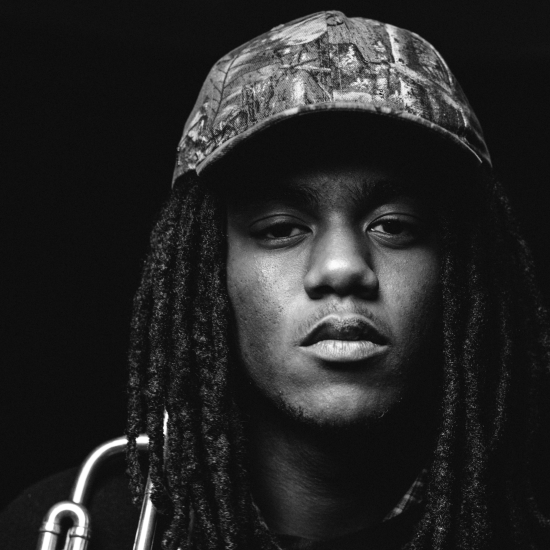
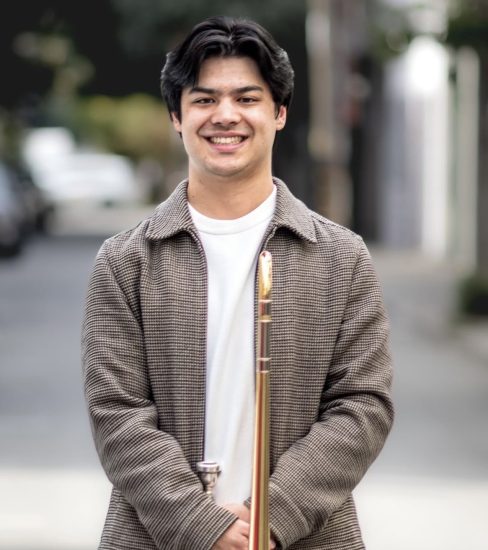
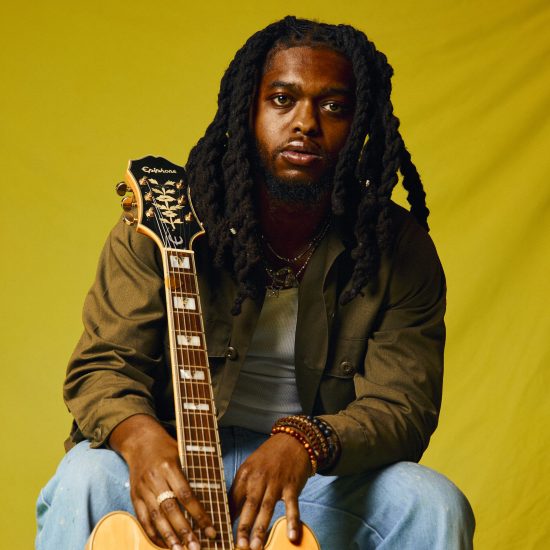
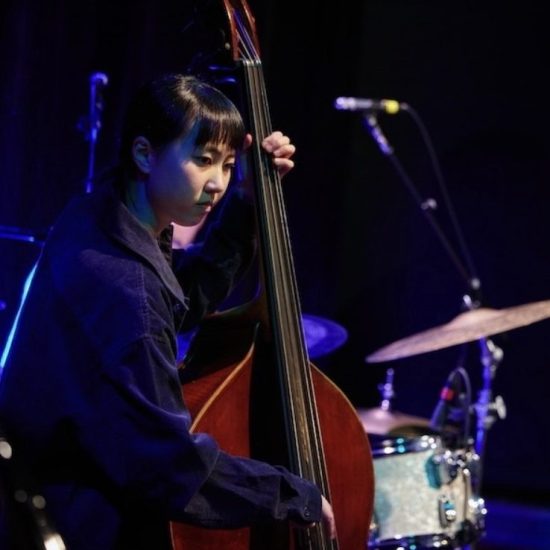
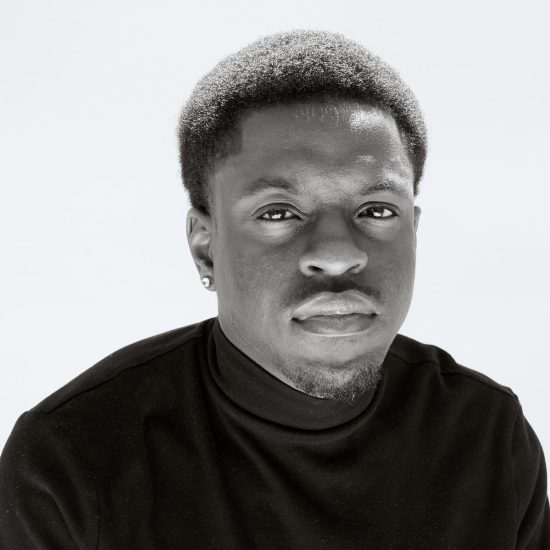
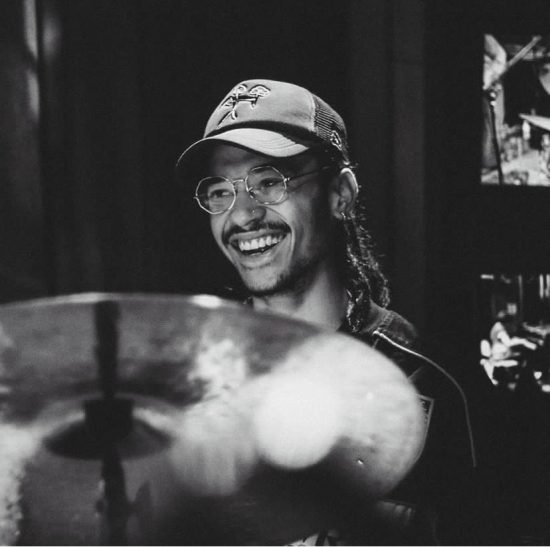
Nicolaus Gelin, trumpet, was born in Miami and began studying violin and piano at age 7 before discovering the trumpet at age 12. He attended the Manhattan School of Music, where he studied with Jon Faddis and Ingrid Jensen. Gelin is a YoungArts winner and was also selected for the Betty Carter Jazz Ahead program at the Kennedy Center. He contributed the original score to a short film by Rosie Elliot, which received the Phil Knight Foundation award. Gelin is also a visual artist whose work was featured at an exhibition in Barcelona.
Nathan Gilbreath, trombone, was born in Seattle, Washington and began his musical studies on piano at age 7 before picking up trombone three years later. While earning his Bachelor’s Degree at the San Francisco Conservatory of Music, he studied with Andre Hayward, Joshua Redman and Marcus Printup. Gilbreath has performed with Matt Brewer, Tom Catanzaro, David Sanchez and Matt Wilson. Gilbreath was named Outstanding Soloist at the Bellevue College Jazz Festival and was selected to participate in the Next Generation Jazz Orchestra. He was also a finalist in the American Trombone Workshop competition.
Mwanzi Harriott, guitar, was born in Miami, Florida, and raised in Atlanta, Georgia. He started learning guitar at age 7 by observing his father playing. He attended Tri-Cities High School, studying classical string bass in the magnet string orchestra program before focusing on jazz guitar. Harriott attended the Berklee College of Music, where he studied with well-respected musicians such as Terri Lyne Carrington, Tim Miller, and Joanne Brackeen among others. During his first year, he was named a recipient of the National YoungArts Honorable Mention Award for guitar. Following his time at Berklee, he moved to New York City, where he led his own band and played with artists such as Orrin Evans and Nasheet Waits. He was also selected to be in the Betty Carter Jazz Ahead 2024 cohort led by Jason Moran.
Yerin Kim, bass, was born in Daejeon, South Korea and began her music studies on piano at age 5. She received her undergraduate degree in Bass Performance from Berklee College of Music, where she was awarded the Wes Wehmiller Memorial Endowed Scholarship and the Berklee International Network Scholarship. Kim participated in the Betty Carter Jazz Ahead program at the Kennedy Center, where she had the opportunity to study with Jason Moran and Benny Green. She has toured internationally with her group, including performances in South Korea, Japan, and the United States. Kim has also studied with Linda May Han Oh, Terri Lyne Carrington, Marquis Hill, and Billy Kilson among others.
Elisee Ngbo, piano, was born and raised in Bridgeport, Connecticut, and began his musical journey in church playing the drums at the age of 3. He earned a degree in Music Performance in Contemporary Percussion from Western Connecticut State University, where he studied with Yale percussion alumnus and jazz vibraphonist, Doug Perry. He also competed in Drum Corps International as a snare drummer. While in college, Ngbo received mentorship from tenor saxophonist, Jackie McLean protégé Jimmy Greene, Buster Williams, Dayna Stephens, Jean Baylor and Jaleel Shaw among others. He went on to earn a Master of Music in Jazz Studies from the Manhattan School of Music, where he served as Jazz Representative for the student body and received a DownBeat Award for a “VSOP Tribute Group.”
Mailo Rakotonanahary, drums, was born in Paris, France, and began studying music at age six. He started playing classical percussion and drums in Toulouse before focusing on jazz at the Conservatoire National Supérieur de Musique et de Danse de Paris. Rakotonanahary won the Best Soloist award at the Trophées du Sunset Sunside. He was a member of the Gutenberg Jazz Collective, where he studied with Terri Lyne Carrington, David Virelles, Christian McBride, and Melissa Aldana among others. He has performed at major jazz festivals and venues across France and won several competitions with his band, AMG. Rakotonanahary is also the recipient of a Fulbright Scholarship.
ABOUT THE HERBIE HANCOCK INSTITUTE OF JAZZ
The Herbie Hancock Institute of Jazz is a nonprofit education organization with a mission to offer the world’s most promising young musicians college level training by internationally acclaimed jazz masters and to present public school music education programs for young people around the world. The Institute preserves, perpetuates and expands jazz as a global art form, and utilizes jazz as a means to unite people of all ages, backgrounds and nationalities. All of the Institute’s programs are provided free of charge to students, schools and communities worldwide. The Institute’s programs use jazz as the medium to encourage imaginative thinking, creativity, a positive self-image, and respect for one’s own and others’ cultural heritage.
www.hancockinstitute.org
ABOUT THE HERB ALPERT SCHOOL OF MUSIC AT UCLA
The UCLA Herb Alpert School of Music prepares students for twenty-first century music careers. Home to renowned musical scholars, music industry experts and world-class musicians, educators and composers within one institution, the school of music offers students a vibrant interdisciplinary education that prizes music performance and scholarship while also emphasizing active engagement in the greater Los Angeles community. Esteeming all musical traditions as vital expressions of an evolving global society, the school of music boasts over 40 ensembles performing music from around the world.
Founded in 2008 with a naming gift of $30 million from the Herb Alpert Foundation, the school of music was formally established as UCLA’s 12th professional school by the UC Regents in 2016. The school originally comprised the departments of ethnomusicology, music and musicology, and has since added interdisciplinary programs in global jazz studies and music industry, and the Herbie Hancock Institute of Jazz Performance. School of music graduates and faculty members are recipients of prestigious MacArthur fellowships, Grammy Awards and Emmy Awards, and are leaders as composers, musicians, educators, scholars and innovators in the music industry. Learn more at www.schoolofmusic.ucla.edu.

